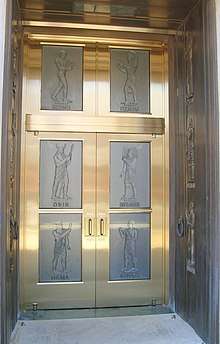Washington Glass School
The Washington Glass School was founded[1] in 2001 by Washington, DC area artists Tim Tate and Erwin Timmers.

The school teaches classes[2] on how to make kiln cast, fused, and cold worked glass sculptures and art. It is the second largest warm glass school in the United States.[3][4]
History
Co-Founder Tim Tate's glass sculpture at the 2000 Artomatic art event [5] was acquired by the Smithsonian American Art Museum for the Renwick Gallery's permanent collection.[6] That sale also provided the funds that started the Washington Glass School.[7] Erwin Timmers' artwork was also on exhibit at Artomatic, where after the show, they began to collaborate, later teaming up to start the Washington Glass School & Studio. Michael Janis joined the school in 2003, and became a Co-Director of the Washington Glass School in 2005.
The school was initially located in the neighborhood where the Washington Nationals Park now stands, and as a result of the construction of the park, had to relocate to the current location in Mount Rainier, Maryland, just over the border with Washington, DC.
In 2008, Artomatic organized an exhibit that focused on how three “glass” cities approach the sculptural medium and hosted by the Washington Glass School. The collaborative show was titled “Glass 3″ referencing the invited glass centers of Washington, DC, Toledo, Ohio and Sunderland, England.[8] The exhibit featured nearly 50 glass artists and created an international partnership and strong relationships that led to more international collaborative interactions.[9] Tim Tate and Michael Janis’ Fulbright Scholarships were both completed at the University of Sunderland and the UK's National Glass Centre.
Washington Glass Studio
The Washington Glass Studio was established as part of the school in 2001 to create site specific art for architectural and landscape environments. The studio draws on the Washington Glass School Co-director’s educational backgrounds in steel and glass sculpture, electronics and video media, architectural design, and ecological sustainability.
Notable public art projects by Washington Glass Studio include the monumental glass doors for the Library of Congress John Adams Building. Under the auspices of the U.S. Architect of the Capitol, the bronze doors to the John Adams Building were replaced in 2013 with code-complaint sculpted glass panels mirroring the original bronze door sculptures by American artist, Lee Lawrie, designed to commemorate the history of the written word, depicting gods of writing as well as real-life Native American Sequoyah. "[10][11]

The public art commission for artwork at the entrance to the Laurel Branch Library was awarded to the Washington Glass Studio in 2016. The 16-foot (4.9 m) high glass-and-steel sculpture was made involving the surrounding community and library groups. In a series of glass making workshops, images of books and stories, education and learning, and shared aspirations were created at the Washington Glass School to be incorporated into the internally illuminated tower.[12]
Faculty
Directors
Glass Secessionism
The Washington Glass School championed a new art movement dubbed Glass Secessionism to "underscore and define the 21st Century Sculptural Glass Movement and to illustrate the differences and strengths compared to late 20th century technique-driven glass. While the 20th century glass artists contributions have been spectacular and ground breaking, this group focuses on the aesthetic of the 21st century. The object of the Glass-Secession is to advance glass as applied to sculptural expression; to draw together those glass artists practicing or otherwise interested in the arts, and to discuss from time to time examples of the Glass-Secession or other narrative work."[14][15][16] Reflecting the evolving nature of glass art, the name of the Facebook group was amended in 2017 to "21st Century Glass : Conversations and Images / Glass Secessionism".
References
- Beckwith, Allison (January 2, 2018). "Inside Mount Rainier's Glass School". The Hyattsville Wire.
- "Video: Washington Glass School". Smithsonian Journeys. February 23, 2010.
- "Policies in Practice - Tim Tate - Office of Disability Employment Policy - United States Department of Labor". www.dol.gov. Retrieved 2018-12-28.
- Editor. "Tim Tate on the Washington Glass School | Bourgeon". Retrieved 2018-12-28.CS1 maint: extra text: authors list (link)
- O'Sullivan, Michael (October 6, 2000). "Art-o-Matic: A Visual Feast For Roving Eyes". The Washington Post. Retrieved 2019-02-11.
- Yaworski, Jill (2009-06-16). "Artomatic Celebrates Anniversary". Huffington Post. Retrieved 2019-02-06.
- Montague, Chip. "The Collector; Reliable Source | Washington Glass Studio". Retrieved 2019-01-29.
- Goss, Heather (February 22, 2008). "Artomatic's Glass3 @ The Shops at Georgetown Park". DCist. Retrieved 2019-04-03.
- Nelson, Barry (March 1, 2013). "From Wearside to Washington DC". DCist. Retrieved 2019-04-16.
- Allen, Erin (April 25, 2014). "The Library in History: The John Adams Building at 75". The Library of Congress Blog. Retrieved 2019-02-10.
- Hanus, Julie; Price, Perry (June–July 2014). "Capitol Improvements". American Craft Magazine.
- Philip, Lisa (May 24, 2016). "Laurel residents create 'community quilt' of glass for new library". The Baltimore Sun. Retrieved January 5, 2019.
- Waggoner, Shawn (Jan–Feb 2017). "Independent Artist Michael Janis A Smart Balance of Personal and Public Art". Glass Art. Jan/Feb 2017: 34.
- "News & Shows | Washington Glass Studio". Retrieved 2018-12-28.
- Moses, Monica (April–May 2014). "The World Beyond Studio Glass". American Craft Magazine.
- "Embracing Narrative: Artwork of the Washington Glass School & Virginia Glass Guild". American Craft Council. Summer 2017.
External links
- Official website
- Facebook group page, 21st Century Glass : Conversations and Images / Glass Secessionism provides examples of 21st century glass sculpture and open discussion topics regarding new directions in glass art.
- “Capitol Improvements”, American Craft Magazine reviews the process in the school's creation of the new cast glass doors for the US Library of Congress Adams Building. June/July 2013.
- "All Things Considered - Interview with Tim Tate: A Tiny Digital Arts Revolution, Encased In Glass." National Public Radio. August 3, 2009.
- WETA TV - "Around Town Visits the Washington Glass School." Aired July 16, 2007.